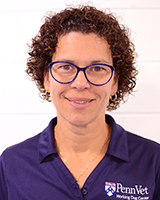 [April 17, 2019; Philadelphia, PA] – The School of Veterinary Medicine at the University of Pennsylvania (Penn Vet) has named Cynthia M. Otto, DVM, PhD, professor of Working Dog Sciences and Sports Medicine in the Department of Clinical Sciences and Advanced Medicine.
[April 17, 2019; Philadelphia, PA] – The School of Veterinary Medicine at the University of Pennsylvania (Penn Vet) has named Cynthia M. Otto, DVM, PhD, professor of Working Dog Sciences and Sports Medicine in the Department of Clinical Sciences and Advanced Medicine.
“Dr. Otto espouses the highest standards of collegiality, clinical service, teaching, and research on working and athletic dogs,” said Oliver A. Garden, Henry and Corinne R. Bower Professor of Medicine and chairman of the Department of Clinical Sciences and Advanced Medicine. “She has carved an amazing career to date, with much still to come. Her caliber is impressive and showcases with incisive clarity, the impact and global reach of the Working Dog Center at Penn Vet. As far as we are aware, we have the very first professor of Working Dog Sciences and Sports Medicine in the world.”
Otto joined Penn Vet in 1991 as associate professor of Critical Care. Inspired by her work with the 9/11 search and rescue canines, she became the founding director in 2012 of the School’s Working Dog Center, a national research and development facility for detection dogs. Otto oversees the fitness and medical care of detection dogs in the program, as well as physical rehabilitation for local law enforcement canines. Her research focuses on all aspects of detection dog health and performance with an emphasis on canine olfactory function. Studies include using dogs to help identify odors associated with difficult-to-diagnose conditions such as ovarian cancer, and evaluating how medications might alter a dog’s sense of smell. In response to the concerns of drug detection dog exposure to opioids, she has investigated the effects of intramuscular and intranasal applications of Naloxone. She has helped develop effective hydration strategies to enhance canine thermoregulation and reduce the risk of heat stroke through collaborations with the Department of Defense, Customs and Border Protection, and industry.
Otto is frequently quoted in the national and international press about medical detection, the behavior of search and rescue dogs, as well as the health and occupational hazards of working dogs. She was named the American Veterinary Management Association’s Bustad Companion Animal Veterinarian of the Year in 2018. Otto, who is dually-boarded in Veterinary Emergency and Critical Care, and Veterinary Sports Medicine and Rehabilitation, earned her veterinary degree at Ohio State University, and her PhD in veterinary physiology from the University of Georgia.
“The mission of the Penn Vet Working Dog Center is to transform global health and safety through working dogs.” said Otto. “Our Center has become so much more than I ever imagined. I want to thank Penn Vet, as well as my peers and colleagues who share my commitment to working dogs, who have been such a pivotal addition to human lives.”